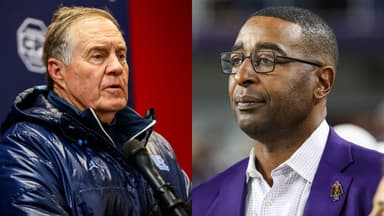Despite being knee-deep in a turbulent 4-7 season at North Carolina, Bill Belichick’s name continues to hover over the NFL hiring cycle. As Josina Anderson reported recently, at least two teams are expected to pursue conversations with him, with a possible third waiting on ownership changes.
Advertisement
This interest alone speaks volumes about Belichick’s resume. But if veteran analyst Colin Cowherd is to be believed, NFL teams should not take their interest forward into a proposal.
On the latest edition of The Herd, Cowherd wasn’t questioning Bill’s six rings. He was instead questioning the trend. As per Cowherd, older defensive coaches simply haven’t aged well in today’s NFL, and he immediately pointed to examples.
Pete Carroll, hired at 74, took over the Raiders and turned them into what he called “the biggest mess in the league.” Belichick’s own Patriots, once he crossed into his 70s, became “embarrassing.” Even the Washington Commanders’ decision to hire an aging Ron Rivera ultimately led to another organizational spiral.
But when Cowherd shifted to offensive-minded coaches, his tone changed completely. “Offensive coaches age better,” he said, noting how Sean Payton at 61 and Andy Reid at 67 are still thriving at a championship level.
Hence, for Cowherd, this is the pattern teams need to consider. Because the moment Bill Belichick entered his post-Brady era, the decline was steep. Since 2019, the Patriots posted just a 34-33 record, hit rock bottom with a 4-13 season in 2023, and consistently ranked near the league’s basement offensively under him.
Meanwhile, that exact window became the greatest stretch of Andy Reid’s life. Between 2019 and now, Reid has gone 52-12 in the regular season, won three Super Bowls, reached seven straight AFC Championship Games, and turned Kansas City into the modern dynasty. Same era, nearly the same age bracket, but completely different outcomes.
View this post on Instagram
That said, while Cowherd didn’t fully explain why he thinks offensive coaches age better, there can be a few logical deductions.
If one were to interpret the logic behind his argument, it could simply be that offensive coaches may be benefiting from the improved creativity + physicality shown by the players while schemes continue to evolve. Defense, by contrast, still lives on discipline, the communication, toughness, and structure.
With today’s rule changes, limited practice time, and a younger generation that doesn’t grow up in defensive systems the way it once did, enforcing that structure is harder than ever. This part, of course, is not Cowherd’s quote but can be a reasonable reading of the landscape he pointed to.
So, as Cowherd would suggest, if NFL teams want to hire a defensive coach, go young. And if they want someone older, history suggests the offense-first coaches are the ones who last.







